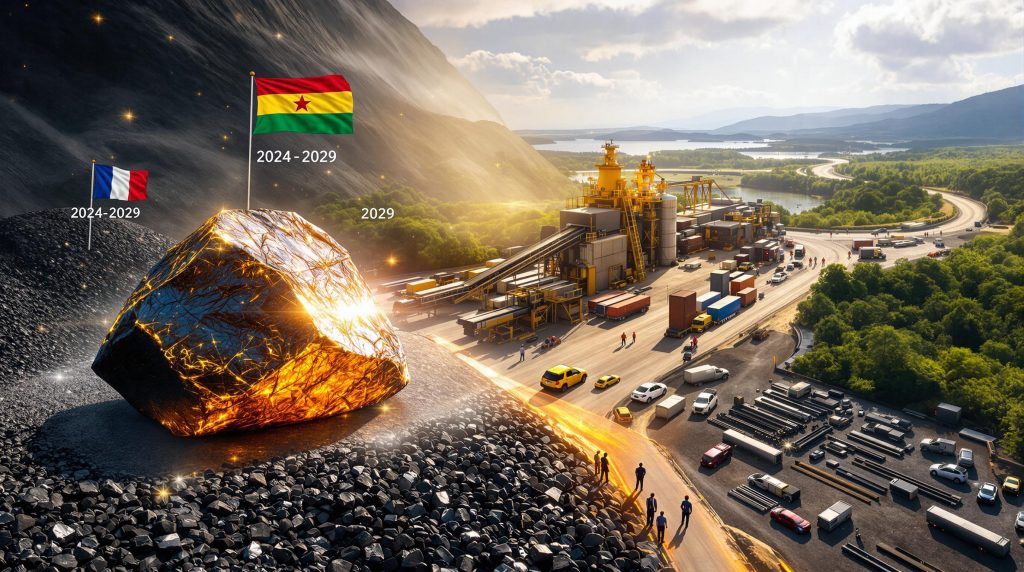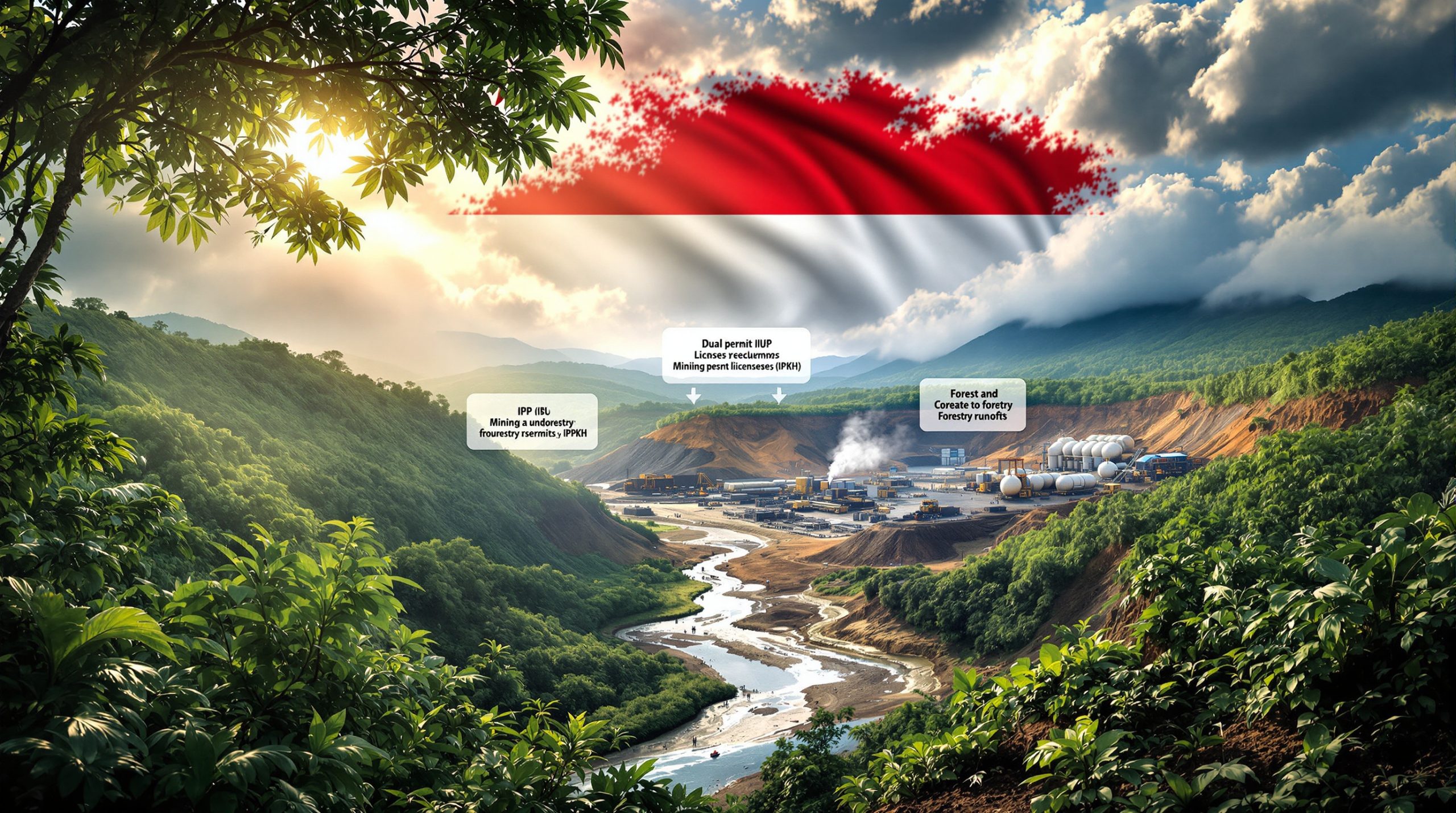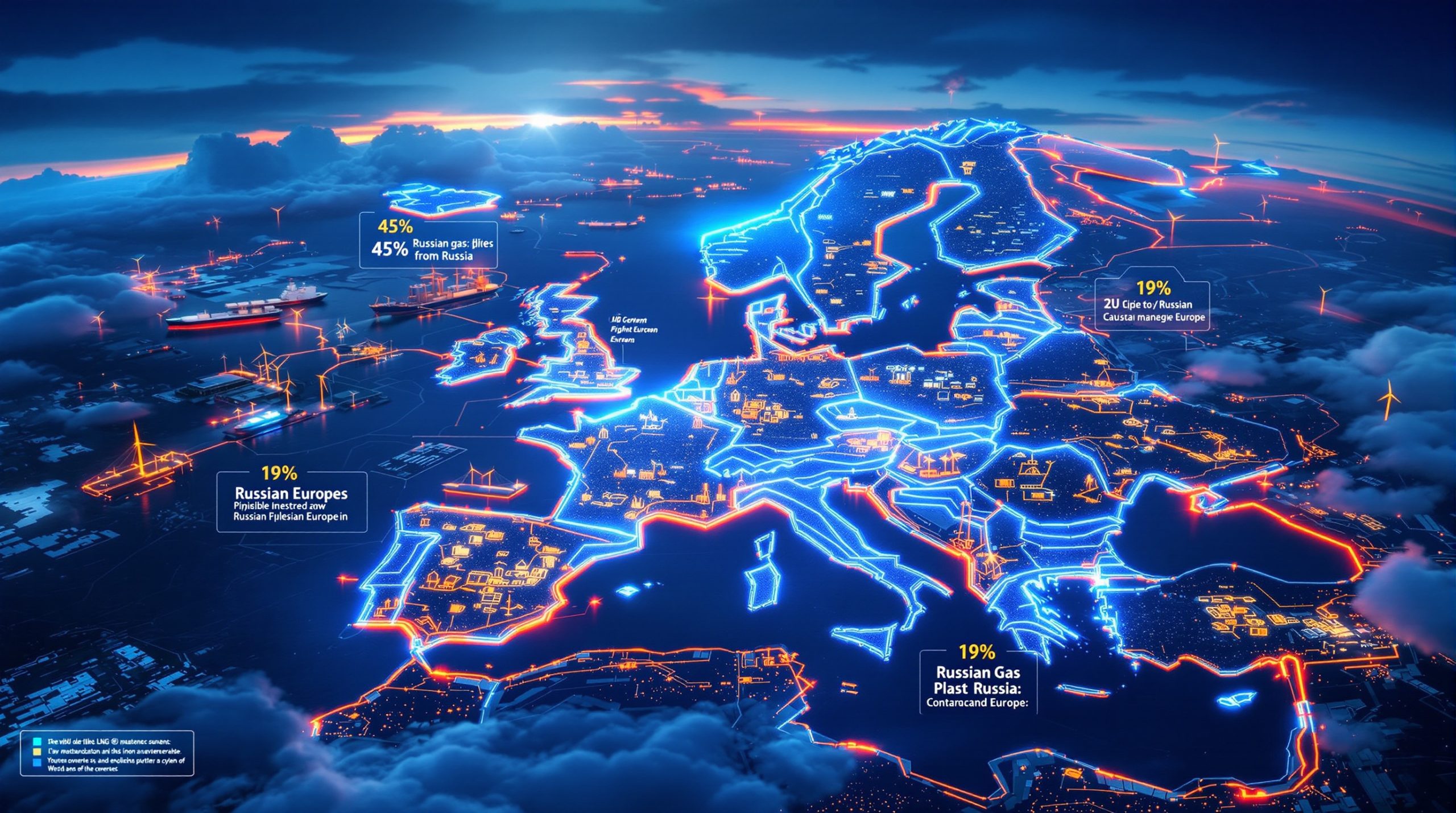Gabon's Manganese Export Ban: Eramet's Strategic Response
Gabon has made a decisive move to transform its mineral resource sector with a ban on raw manganese exports set to take effect from January 2029. This policy shift represents a significant development for the manganese-rich nation and has prompted immediate strategic adjustments from mining companies operating in the country, most notably French mining group Eramet.
What is Gabon's New Manganese Export Policy?
Gabon Announces Raw Manganese Export Ban
In May 2025, the Gabonese government announced a ban on unrefined manganese exports that will take effect from January 2029. This policy aligns with a broader West African movement to capture more value from mineral resources rather than simply exporting raw materials. The government's initiative aims to boost local processing capabilities and advance the country's industrialization goals.
The export ban represents a paradigm shift for Gabon's mining sector, which has historically focused on extraction and exportation of raw materials. With nearly four years to prepare, mining companies operating in the country now face the challenge of adapting their business models to comply with the new regulations.
Strategic Importance of Gabon's Manganese Reserves
Gabon holds some of the world's richest manganese deposits, making it a key player in the global supply chain for this essential mineral. As Reuters reported in August 2025, "Gabon, also an oil exporter, holds some of the world's richest manganese deposits that are primarily operated by Eramet's Comilog subsidiary."
Manganese serves as a critical component in steel production, with no viable substitutes in most applications. It enhances steel's durability, strength, and resistance to oxidation—properties essential for infrastructure development, automotive manufacturing, and construction industries worldwide.
By implementing this export ban, Gabon's government is strategically positioning the country to maximize economic benefits beyond mere extraction. The policy reflects a growing recognition that raw material exports provide limited economic returns compared to processed products higher up the value chain.
How is Eramet Responding to Gabon's Export Ban?
New Leadership Appointment Focused on Processing
In a clear response to Gabon's mining policy shift, Eramet has appointed Clement Jakymiw as director of value chain transformation in Gabon. According to Reuters, Jakymiw "was previously deputy chief operating officer in charge of manganese ore" and will report directly to CEO Paulo Castellari in his new role.
This strategic appointment signals Eramet's commitment to transforming its operations in Gabon to align with the country's new direction. By creating a dedicated leadership position focused specifically on value chain transformation, Eramet demonstrates its intention to develop substantial processing capabilities before the 2029 deadline.
The appointment represents more than just compliance with regulations—it suggests Eramet views the policy shift as an opportunity to evolve its business model and potentially capture greater value from its Gabonese operations in the long term.
High-Level Diplomatic Engagement
Eramet has also engaged in high-level diplomatic discussions with Gabonese leadership. Reuters reported that "CEO Paulo Castellari said at the end of July that he had met Gabonese President Brice Oligui Nguema following the decision" to ban raw manganese exports.
This diplomatic approach highlights the importance of government relations in navigating regulatory changes in resource-rich nations. Castellari himself acknowledged the alignment between Eramet's strategy and Gabon's national policy, stating: "This approach echoes the country's ambition for industrialization and local processing and is part of the longstanding partnership that has united Eramet with Gabon, the Group's historic home for nearly thirty years."
By maintaining open dialogue with government officials, Eramet is positioning itself as a partner in Gabon's development rather than merely a resource extractor—a distinction that may prove valuable during the transition period and beyond.
What is Eramet's Current Manganese Operation in Gabon?
Comilog Subsidiary Operations
Eramet operates in Gabon primarily through its Comilog subsidiary, which has been active in the country for nearly three decades. This long-standing presence has established Eramet as a significant player in Gabon's mining sector and the broader economy.
The Gabonese government maintains a minority stake in Comilog, creating a partnership structure that aligns national and corporate interests. This shared ownership may facilitate cooperation during the transition to increased local processing, as both parties have a vested interest in the continued success of manganese operations.
Comilog's extensive experience in Gabon provides Eramet with valuable local knowledge, established infrastructure, and community relationships that could prove advantageous when developing new processing capabilities.
Current Processing vs. Export Balance
According to Reuters, "Comilog, in which Gabon holds a minority stake, processes some manganese locally but mostly exports its ore." This indicates that while some processing capacity already exists, Eramet will need to significantly expand these operations to comply with the 2029 export ban.
The current business model remains heavily export-oriented, with raw ore constituting the majority of Eramet's manganese output from Gabon. This imbalance underscores the scale of transformation required—transitioning from primarily exporting raw materials to processing the majority of production locally represents a fundamental shift in operations.
What Challenges Does the Export Ban Create for Eramet?
Business Model Transformation Requirements
Eramet faces substantial challenges in transforming its business model from export-focused to processing-focused operations. This shift will require significant capital investment in processing facilities capable of handling the volume of manganese currently being exported as raw ore.
Beyond physical infrastructure, the company will need to develop or acquire technical expertise in advanced processing operations. This may involve retraining existing staff, recruiting specialists, or partnering with entities that possess relevant processing know-how.
The supply chain for processed manganese products differs significantly from that of raw ore, necessitating new logistics arrangements, customer relationships, and market strategies. Each of these elements adds complexity to the transformation process.
Timeline Considerations
With less than four years until the January 2029 deadline, Eramet faces considerable time pressure to implement the necessary changes. Processing facilities require substantial planning, permitting, construction, and commissioning time—processes that typically extend over several years for major industrial installations.
A phased approach will likely be necessary to maintain business continuity while developing processing capabilities. This might involve gradually increasing the proportion of ore processed locally while continuing limited exports until facilities reach full capacity.
Strategic planning must balance short-term operational needs with long-term compliance requirements, potentially requiring difficult decisions about resource allocation and investment prioritization during the transition period.
How Might Local Processing Benefit Gabon's Economy?
Value Addition Opportunities
Processing manganese locally creates higher-value products than raw ore exports, potentially increasing Gabon's revenue from its natural resources. These processed products command premium prices in global markets compared to unrefined materials.
Local processing operations typically require more skilled labor than extraction activities, creating opportunities for job creation in technical roles. These positions often offer higher wages and better working conditions than those in primary extraction.
As processing operations mature, Gabon can develop local technical expertise and capabilities, reducing dependence on foreign specialists and creating a more sustainable skills base for future industrial development.
By moving beyond simple resource extraction, Gabon can diversify its economy and reduce vulnerability to commodity price fluctuations that disproportionately affect raw material exporters.
Industrial Development Potential
Processing facilities could become the foundation for broader industrial development in Gabon. Once basic processing infrastructure exists, the country may be able to attract investment in downstream industries that use processed manganese as input materials.
The development of a processing sector creates opportunities for technology transfer and skills development that can benefit the broader economy. Technical knowledge, quality control processes, and management systems implemented for manganese processing can be adapted to other industries.
By moving up the manganese value chain, Gabon can enhance its position in global markets and potentially develop a reputation as a processing hub rather than merely a source of raw materials.
What Are the Broader Implications for Resource-Rich African Nations?
Regional Trend Toward Resource Nationalism
Gabon's policy aligns with similar moves across West Africa and the broader continent, reflecting a regional trend toward resource nationalism. As Reuters noted, Gabon is "joining other West African states in seeking to capture more value from their mining resources."
This shift represents a growing emphasis on mineral beneficiation across the continent, with governments increasingly unwilling to accept colonial-era extraction models that provided limited benefits to host nations.
Resource-rich countries are seeking to balance foreign investment with national economic development, recognizing that raw material exports alone rarely generate sufficient economic transformation to address development challenges.
Changing Dynamics for Mining Companies
Mining firms operating in Africa must adapt to evolving regulatory environments that increasingly prioritize local processing and value addition. Companies that proactively develop processing capabilities may gain competitive advantages over those that resist these changes.
The growing expectation for local processing extends beyond manganese to multiple commodities, suggesting a fundamental shift in the operating environment for extractive industries across the continent.
Forward-thinking mining companies are developing more flexible operational models that can accommodate varying levels of in-country processing requirements. This adaptability may become a key differentiator in securing access to valuable resource deposits.
Government relations and partnership approaches are gaining importance as mining companies recognize that collaborative relationships with host governments can facilitate smoother transitions when regulatory requirements change.
What is the Global Context for Manganese Markets?
Manganese's Role in Steel Production
Manganese remains an essential ingredient in steel manufacturing, with approximately 90% of global manganese production used in steel applications. Its ability to improve steel's hardness and resistance to abrasion makes it irreplaceable in most production processes.
Growing infrastructure development globally, particularly in emerging economies, continues to drive demand for steel and, by extension, manganese. Urbanization trends in Asia and Africa suggest this demand will remain strong for decades.
Beyond its traditional applications, manganese is gaining importance in newer technologies, including certain types of batteries for energy storage applications, creating additional demand sources for processed manganese products.
Supply Chain Considerations
Processing capacity for manganese remains concentrated in certain regions, with China dominating many aspects of the value chain. Gabon's push for local processing could contribute to a gradual geographic diversification of processing capabilities.
Steel producers dependent on manganese may face adjustment challenges as processing locations shift, potentially affecting established supply relationships and logistics arrangements.
The market will likely experience price impacts as it adjusts to new processing dynamics, with potential premium pricing for processed products from regions with reliable regulatory environments and quality control standards.
What Could Eramet's Processing Strategy Look Like?
Potential Processing Technologies
Eramet has several beneficiation and refinement options to consider, ranging from basic concentration processes to advanced refining technologies that produce high-purity manganese products.
Different grades of processed manganese serve various applications, from standard ferromanganese for basic steel production to electrolytic manganese dioxide for battery applications. Eramet's technology selection will depend partly on target markets for processed output.
The company must balance capital investment against value creation potential, selecting technologies that provide the best return on investment while meeting regulatory requirements and market demands.
Technology selection will significantly influence long-term competitiveness, as more efficient or flexible processing systems could provide advantages in a dynamic market environment.
Investment and Development Timeline
A phased approach to processing development would allow Eramet to manage the transition while maintaining revenue streams. Initial investments might focus on expanding existing processing facilities before developing more advanced capabilities.
Infrastructure development beyond processing facilities themselves will be necessary, potentially including power generation or transmission improvements, water management systems, and transportation infrastructure for processed products.
Workforce development programs will be essential to prepare local personnel for more technical operations, potentially involving partnerships with educational institutions or specialized training providers.
FAQs About Gabon's Manganese Export Ban
What is manganese primarily used for?
Manganese is primarily used in steel production, where it serves as an essential alloying element that improves strength, hardness, and resistance to abrasion. No viable substitutes exist for manganese in most steelmaking applications, making it a critical industrial material.
Beyond steel, manganese finds applications in aluminum alloys, various chemical processes, and increasingly in battery technologies. High-purity manganese compounds are used in alkaline batteries, while manganese dioxide serves as a cathode material in certain lithium-ion battery formulations.
Agricultural applications include manganese-based fertilizers that address soil deficiencies of this essential plant nutrient. The mineral also finds use in animal feed supplements to support proper growth and development.
Why are countries implementing raw mineral export bans?
Countries implement raw mineral export bans primarily to capture more value from their natural resources. Processing raw materials locally can multiply the economic value compared to exporting unprocessed resources.
These policies aim to create local jobs, particularly in higher-skilled positions associated with processing operations. The employment benefits extend beyond direct jobs to include supporting industries and services.
Export bans support domestic industrial development by providing processed inputs for downstream manufacturers. This can help countries diversify their economies beyond primary resource extraction.
Nations with significant mineral resources seek to increase tax revenues through the higher value of processed exports. Additionally, local processing reduces economic dependence on volatile commodity markets that often disadvantage raw material exporters.
How significant is Gabon in global manganese production?
Gabon ranks among the world's top manganese producers, with deposits that are particularly valued for their high grade and quality. The country's production represents a significant portion of global manganese supply.
As Reuters noted, "Gabon holds some of the world's richest manganese deposits," making it a key player in the manganese market. The quality of Gabonese manganese makes it particularly suitable for high-grade applications.
Eramet's Comilog operations in Gabon have established the country as a reliable supplier to global markets over several decades. This reputation for quality and reliability enhances Gabon's significance beyond pure production volumes.
What other African countries have implemented similar mineral processing requirements?
Several African countries have implemented or are considering similar requirements to boost local mineral processing:
-
Indonesia pioneered this approach with its nickel export ban, which has successfully attracted significant investment in local processing facilities.
-
Zimbabwe has introduced requirements for local processing of platinum group metals to capture more value from these precious resources.
-
Tanzania has implemented regulations encouraging domestic processing of gold and copper, including export restrictions on certain unprocessed minerals.
-
Democratic Republic of Congo has pushed for increased local processing of copper and cobalt, leveraging its dominant position in cobalt markets.
These policies reflect a continent-wide trend toward greater resource sovereignty and value capture from Africa's abundant mineral wealth.
Balancing National Interests with Industrial Realities
The appointment of a dedicated processing executive signals Eramet's recognition of the changing landscape for resource extraction in Africa. As Gabon moves to implement its ban on raw manganese exports by 2029, mining companies must adapt their business models to incorporate more local processing and value addition.
This transition represents both challenges and opportunities—requiring significant investment and expertise while potentially creating a more sustainable and mutually beneficial relationship between resource companies and host nations. The mining industry evolution underway across Africa reflects a fundamental reassessment of how mineral wealth should benefit host countries.
Companies investing in critical minerals recycling and processing technologies may find themselves better positioned as regulatory environments continue to evolve. Furthermore, governments worldwide are developing comprehensive critical minerals strategy frameworks that increasingly emphasize domestic processing capabilities.
The coming years will reveal whether Eramet's strategic response successfully navigates this evolving environment while maintaining its position as a key player in Gabon's manganese sector. Companies that embrace local processing requirements as opportunities rather than obstacles may find themselves better positioned in an era of increasing resource nationalism across the African continent.
Disclaimer: This article contains analysis of market trends and policy developments. While we strive for accuracy, readers should conduct their own research before making business or investment decisions related to the manganese sector or mining companies operating in Gabon.
Interested in Spotting the Next Major Mineral Discovery?
Stay ahead of the market with Discovery Alert's proprietary Discovery IQ model, which instantly notifies investors of significant ASX mineral discoveries, transforming complex data into actionable insights. Visit our dedicated discoveries page to understand how historic discoveries have generated substantial returns for early investors.




